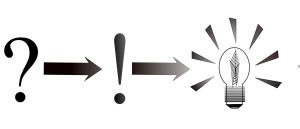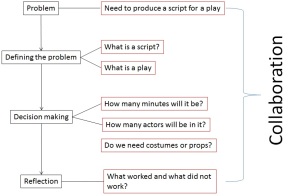 What is critical thinking? In its simplest terms, Critical thinking is about thinking clearly and rationally, and with regards to children, enabling them to think for ourselves. Some may argue that we do this all of the time but perhaps this is not the case. Think of how many times you may have clicked on a link embedded in a social media site. Let’s say the link concerns a breaking-news article. You follow the link, read the article and digest the information. You may talk to a neighbour or work colleague and discuss what you have read. They too may look online or read a newspaper; and so on. But what is important to consider is whether the source of the story been questioned, or whether the article is biased. If it has not and the information has been taken at face-value, then no one had attempted any critical thinking to challenge the general assumption that has been made. This type of behaviour may start at any time in childhood, but a particularly good example may be a child at school who does not agree with what their teacher is saying and is not allowed to express their views because the teacher considers themselves the authority when it comes to knowledge and that children should be passive learners. If the teacher really wishes to help the children they teach to be able to think for themselves, they create an environment where it is easy for the children to ask questions and ultimately nurture a culture of critical thinking. Creative writing workshops are the ideal environment for children to use their critical thinking skills. Figure 1 demonstrates the process some of the aspects of critical thinking in a creative writing workshop
What is critical thinking? In its simplest terms, Critical thinking is about thinking clearly and rationally, and with regards to children, enabling them to think for ourselves. Some may argue that we do this all of the time but perhaps this is not the case. Think of how many times you may have clicked on a link embedded in a social media site. Let’s say the link concerns a breaking-news article. You follow the link, read the article and digest the information. You may talk to a neighbour or work colleague and discuss what you have read. They too may look online or read a newspaper; and so on. But what is important to consider is whether the source of the story been questioned, or whether the article is biased. If it has not and the information has been taken at face-value, then no one had attempted any critical thinking to challenge the general assumption that has been made. This type of behaviour may start at any time in childhood, but a particularly good example may be a child at school who does not agree with what their teacher is saying and is not allowed to express their views because the teacher considers themselves the authority when it comes to knowledge and that children should be passive learners. If the teacher really wishes to help the children they teach to be able to think for themselves, they create an environment where it is easy for the children to ask questions and ultimately nurture a culture of critical thinking. Creative writing workshops are the ideal environment for children to use their critical thinking skills. Figure 1 demonstrates the process some of the aspects of critical thinking in a creative writing workshop
This seems an ambitious group of criteria, but these concepts are not difficult to get children to engage with, because children are natural critical thinkers. They question everything. ‘Why do I need my shoes on to go outside?’, ‘Why is it time for bed, just because it’s dark?’, ‘Why does snow melt?’ These inquisitive questions are the source of many headaches for parents’ as they struggle to answer a barrage of seemingly abstract and random thought processes. But the more the parents discuss these questions with their children, the better the children are able to critically think. Figure 1demonstrates that collaboration plays a prominent role in the children’s engagement with critical thinking, because they need help from their peers. There is also a degree of scaffolding or support given by the workshop leader, in the form of constructive direction such as questions or hints. But, wherever possible it is important for the children to take the lead. This is not to say that the workshop leader knows everything, far from it. In fact, one of the wonderful features of a creative writing workshop is that the leader will often learn from the child. Each workshop provides a potential opportunity for re-developing critical thinking in children and in the process, their capacity for creativity teaches those working with them. As Paulo Freire (1972) discovered, the learning process should be two-way and far more rewarding and empowering for everyone concerned. So the children in a creative writing workshop are capable of shaping their working environment and the end result of their endeavours. This is why it is so important to encourage children to think about what they are doing, why they are doing it and what they want changed in a workshop. It is why anyone running a writing workshop should remain sensitive to any aspects of a workshop that their participants are not happy with and change it. Because of this approach each workshop is unique, even if the overall theme is the same. By listening to children and acting on those ideas, self-esteem and confidence is fostered. If children question things, without accepting them at face-value, they are starting their re-development of critical thinking. References Freire, P. (1972). Pedagogy of the oppressed. London, Penguin. Pithers, R.T. (2000), ‘Critical thinking in education: a review.’, Educational Research, 42(3), p237–249

